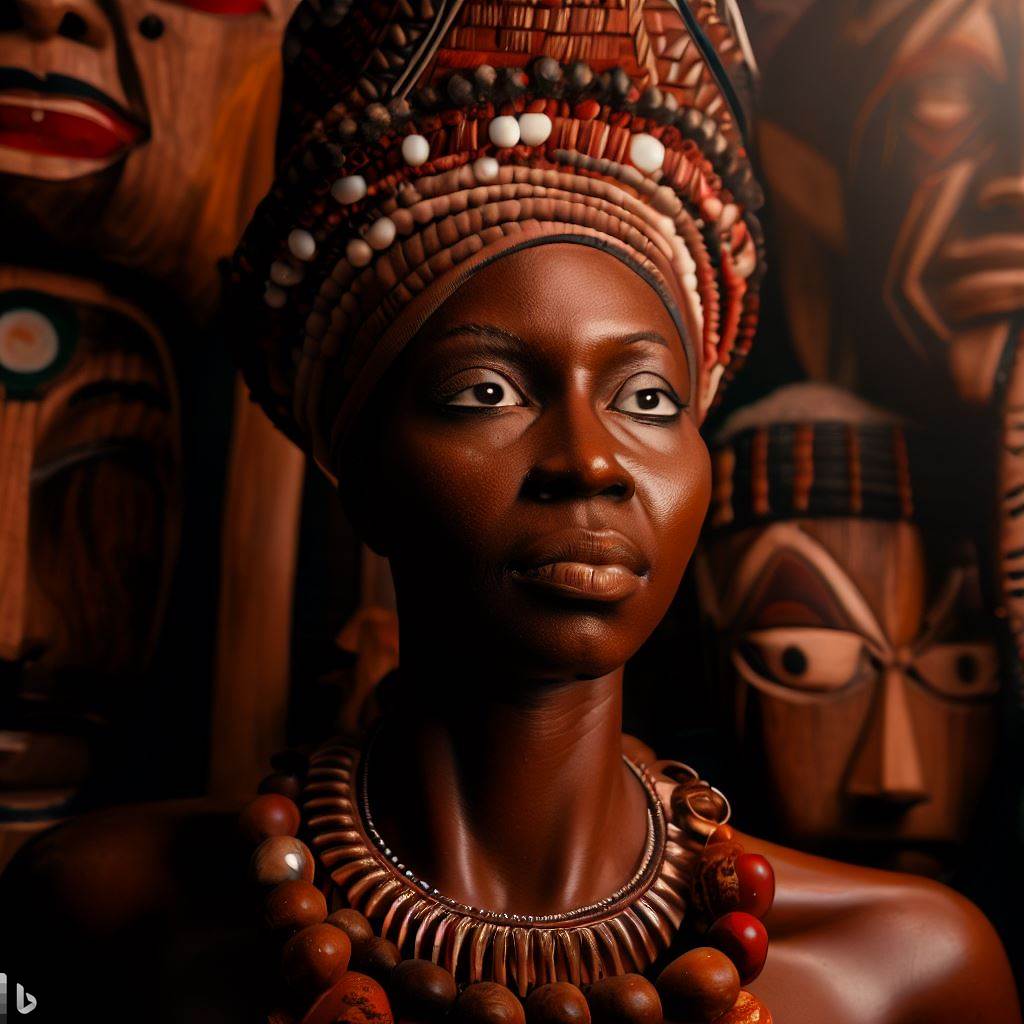Introduction
Nigeria’s Interior Design Industry: Salary and Job Outlook
Welcome to a detailed exploration of Nigeria’s Interior Design Industry, where we will examine the salary and job outlook for professionals in this field.
Overview of Nigeria’s Interior Design Industry
Nigeria’s interior design industry is a thriving sector, playing a vital role in shaping the aesthetics of various spaces.
It has experienced significant growth in recent years, reflecting the increasing importance people place on designing their spaces.
Interior design involves creating functional and visually appealing environments that align with clients’ goals and preferences.
From residential homes to commercial spaces, interior designers in Nigeria have gained recognition for their creativity and ability to transform spaces.
The industry’s growth can be attributed to several factors, including the rising middle-class population, urbanization, and the demand for personalized spaces.
More individuals and businesses are seeking professional expertise to enhance their living and working environments.
Moreover, Nigeria’s interior design industry has witnessed an influx of skilled professionals, leading to increased competition and improved quality of services.
This has resulted in higher expectations and standards within the industry.
As the industry continues to mature, professionals in the interior design field have seen a rise in earning potential.
With clients increasingly valuing the skills and expertise of interior designers, salaries have become more competitive, providing attractive remuneration packages.
Therefore, Nigeria’s interior design industry is flourishing and holds great potential for both aspiring and established professionals.
As we delve deeper into this blog series, we will explore the salary prospects and job outlook for interior designers in Nigeria, shedding light on the exciting opportunities awaiting talented individuals in this field.
Job Outlook in Nigeria’s Interior Design Industry
In this section, we will discuss the current job market and demand for interior designers in Nigeria.
We will also highlight the opportunities available for professionals in the field.
Current Job Market and Demand for Interior Designers in Nigeria
The interior design industry in Nigeria is experiencing significant growth and development.
With the booming economy and increasing urbanization, there is a growing demand for skilled interior designers across the country.
Interior designers play a crucial role in creating aesthetically pleasing and functional spaces.
Their skills are sought after in various sectors, including residential, commercial, hospitality, healthcare, and retail. As a result, the job market for interior designers is highly competitive.
Companies and individuals are recognizing the importance of good interior design, not only for enhancing the visual appeal but also for improving productivity and well-being.
This has led to an increased demand for interior designers who can create innovative designs that meet the specific needs of clients.
Furthermore, the rise of social media platforms and interior design websites has created more awareness and appreciation for modern interior design styles.
This has contributed to the growing demand for interior designers who can meet the expectations of clients with unique and trendy designs.
Opportunities Available for Professionals in the Field
In the competitive Nigerian job market, interior design professionals find abundant opportunities despite challenges.
Key avenues include:
- High-Profile Projects: Designers tackle notable assignments in a developing Nigeria, such as luxury homes, hotels, and office complexes.
- Collaboration with Global Firms: Foreign investments draw international design companies, fostering local-global partnerships.
- Sustainable Solutions Demand: Eco-awareness boosts need for environmentally-conscious designers employing green materials and practices.
- Entrepreneurial Landscape: Thriving entrepreneurship lets designers launch own firms, ensuring creative control and leadership establishment.
The industry’s outlook is positive, driven by:
- Growing demand for skilled designers
- International firms’ influx
- Eco-friendly solutions requirement
- Flourishing entrepreneurship
Success hinges on aptitude, innovation, and business proficiency. Interior design careers in Nigeria promise fulfillment and triumph.
Read: Top Interior Design Schools in Nigeria: A Comprehensive List
Salary Range for Interior Designers in Nigeria
Interior design is a thriving industry in Nigeria, offering numerous opportunities for professionals in this field.
With the growing demand for aesthetically pleasing and functional spaces, interior designers play a crucial role in creating beautiful and practical living and working environments.
In this section, we will explore the salary range for interior designers in Nigeria and discuss factors that may affect their earning potential.
Overview of the salary range
- The salary range for interior designers in Nigeria varies depending on several factors.
- Entry-level designers can expect to earn between ₦800,000 to ₦1,500,000 per year.
- Mid-level designers with a few years of experience can earn between ₦1,500,000 to ₦3,000,000 per year.
- Senior-level designers with significant experience and a strong portfolio can earn above ₦3,000,000 per year.
Factors that may affect salary levels
Experience
- As with any profession, experience plays a significant role in determining an interior designer’s salary.
- Entry-level designers with limited experience usually earn less compared to their more seasoned counterparts.
- Mid-level and senior-level designers who have successfully completed several projects and garnered a positive reputation tend to command higher salaries.
Location
- The location of a designer’s practice greatly influences their earning potential.
- Designers based in major cities like Lagos and Abuja generally earn higher salaries compared to those located in smaller towns.
- This is due to the increased demand for design services in urban centers and the higher cost of living associated with these areas.
Clientele and project scope
- The type of clients and projects an interior designer works with can directly impact their salary.
- Designers who work with high-profile clients or large-scale projects often command higher fees.
- These projects may involve luxury residential properties, commercial spaces, or high-end hospitality establishments.
Skillset and specialization
- Interior designers who possess unique skills and specialize in specific areas can earn higher salaries.
- Specializations such as sustainable design, hospitality design, or healthcare design are in high demand and can result in higher income potential.
- Relevant certifications and advanced qualifications in specialized fields can also contribute to increased earning potential.
Networking and reputation
- Building a strong professional network and fostering a positive reputation within the industry can lead to higher-paying job opportunities.
- Designers who have established themselves as industry leaders and have a portfolio of successful projects often attract higher-paying clients.
Basically, the salary range for interior designers in Nigeria can vary greatly depending on factors such as experience, location, clientele, specialization, and reputation.
While entry-level designers may start with modest salaries, those with valuable experience and a strong portfolio can command significantly higher incomes.
It is important for aspiring designers to continuously enhance their skills, build a professional network, and stay updated with industry trends to maximize their earning potential in this competitive field.
Read: Exploring the Nigerian Animation Market: An Overview

Factors Influencing Salaries in Nigeria’s Interior Design Industry
When it comes to the interior design industry in Nigeria, there are several factors that influence salaries.
These factors can greatly impact the earning potential of professionals in this field.
In this section, we will explore the various factors that play a role in determining salaries in Nigeria’s interior design industry.
Education
- The level of education a designer has attained can significantly impact their salary.
- A designer with a bachelor’s degree in interior design is likely to earn more compared to one without a degree.
- Higher education demonstrates a commitment to the field and provides a solid foundation of knowledge and skills.
Skills
- The specific skills a designer possesses can also influence their salary.
- Designers with a diverse set of skills, such as knowledge of CAD software, project management, and budgeting, are highly sought after and can command higher salaries.
- Having strong communication, problem-solving, and creativity skills also adds value to a designer’s profile.
Specialization
- Interior designers who specialize in a particular area, such as residential or commercial design, may earn higher salaries.
- Specialization allows designers to develop expertise in a specific niche, making them more valuable to clients and employers.
- Designers who can offer unique solutions and cater to specific market demands have a competitive edge in terms of salary negotiation.
Expertise
- Experience and expertise play a crucial role in determining salary levels in the interior design industry.
- Designers with a proven track record of successful projects and satisfied clients are often able to command higher salaries.
- Years of experience in the industry allow designers to hone their skills, build a reputation, and establish a strong client base.
Location
- The geographical location of a designer can also affect their salary.
- Designers working in major cities like Lagos and Abuja may earn higher salaries compared to those in smaller towns.
- Locations with a high cost of living or a high demand for interior design services tend to offer more lucrative job opportunities.
Portfolio
- A designer’s portfolio showcases their previous work and serves as a testament to their skills and creativity.
- A strong portfolio can greatly influence salary levels, as it demonstrates a designer’s ability to deliver high-quality designs.
- Clients and employers are more likely to value and compensate designers with an impressive portfolio.
Industry Demand
- The overall demand for interior design services in Nigeria can impact salary levels.
- During times of increased demand, designers may have more bargaining power and can negotiate higher salaries.
- Industry trends and market conditions can also influence the availability and compensation of job opportunities.
In fact, there are various factors that influence salaries in Nigeria’s interior design industry.
These factors include education, skills, specialization, expertise, location, portfolio, and industry demand.
To maximize earning potential, designers should focus on continuous education, developing a diverse skill set, specializing in a niche, and building a strong portfolio.
Additionally, staying up-to-date with industry trends and positioning oneself in high-demand areas can also contribute to higher salary levels.
Read: Becoming an Interior Designer in Nigeria: A Step-by-Step Guide
Career Growth and Advancement in Nigeria’s Interior Design Industry
In the dynamic and ever-evolving field of interior design, professionals have ample opportunities for career growth and advancement.
With the expanding interest in aesthetic spaces and functional designs, Nigeria’s interior design industry presents a promising future for those willing to put in the effort and dedication.
Potential Career Growth Opportunities in the Industry
- Specialization: Interior designers can choose to specialize in specific areas like residential, commercial, hospitality, or healthcare design.
- Project Management: Experienced designers can take up project management roles, overseeing multiple projects and teams.
- Entrepreneurship: Starting their design firms allows designers to have more control over projects and potentially earn higher incomes.
- Education: Many professionals transition into teaching and mentoring roles, sharing their expertise and shaping the future generation of designers.
- Consultancy: Experienced designers can offer consultancy services, providing expert advice to individuals or organizations.
Advancement in Career and Increased Earning Potential
To advance in their careers and unlock higher earning potential, interior designers can consider the following strategies
Continuous Learning and Skill Development
Staying updated with the latest design trends, software, and technologies can give designers an edge and open doors to higher-paying projects.
Networking and Collaboration
Building a strong professional network and collaborating with other industry experts can lead to exciting opportunities and higher-paying clients.
Professional Certifications
Obtaining certifications from recognized design associations or institutions adds credibility to one’s profile and increases chances of career growth.
Building a Strong Portfolio
A well-curated portfolio showcasing diverse projects and successful designs can attract high-profile clients and lucrative contracts.
Mentorship and Apprenticeship
Seeking mentorship from established designers or participating in apprenticeship programs can provide valuable guidance and accelerated growth.
Industry Recognition
Participating in design competitions, receiving awards, or getting featured in industry publications can significantly boost one’s professional status and earning potential.
Client Relationship Management
Providing exceptional services, maintaining strong client relationships, and receiving positive referrals can lead to an expanded client base and increased earnings.
Expanding Market Reach
Exploring opportunities beyond local boundaries by targeting national or international clients can open up new avenues for income growth.
Embracing Sustainable Design
The growing demand for environmentally friendly designs presents an opportunity for designers to specialize in sustainable practices, attracting clients willing to pay a premium.
Utilizing social media and Online Presence
Establishing a strong online presence through platforms like websites, blogs, and social media allows designers to reach a wider audience and attract potential clients.
In summary, Nigeria’s interior design industry offers numerous avenues for career growth and advancement.
By continuously updating skills, networking, building a strong portfolio, and embracing new opportunities, interior designers can increase their earning potential and make a significant impact in the industry.
Read: Continuing Education for Systems Engineers in Nigeria
Discover More: Exploring Costume Designer Salary Expectations in Nigeria
Challenges and Opportunities in Nigeria’s Interior Design Industry
As with any industry, Nigeria’s interior design industry faces its fair share of challenges.
From a lack of recognition to limited resources, professionals in this field often have to overcome obstacles in order to succeed.
However, despite these challenges, there are also numerous opportunities for growth and development in the industry.
Challenges Faced by Professionals in the Industry
- Lack of recognition: Interior design is often seen as a luxury service, leading to a lack of recognition for the professionals in this field.
- Limited resources: Many interior designers in Nigeria struggle with limited resources, such as access to high-quality materials and tools.
- Competition: The interior design industry in Nigeria is highly competitive, making it difficult for professionals to stand out and secure clients.
- Changing trends: Staying up to date with the latest trends is crucial in this industry, but it can be challenging for professionals to keep up with the ever-evolving preferences of clients.
- Client perceptions: Some clients perceive interior design as an unnecessary expense, which can make it challenging for professionals to convince them of the value they provide.
Opportunities for Growth and Development in the Field
- Expanding middle class: The expanding middle class in Nigeria presents a significant opportunity for interior designers to cater to the needs and preferences of this demographic.
- Corporate sector growth: As more businesses and corporations set up offices in Nigeria, there is a need for interior designers to create functional and appealing workspaces.
- Government support: The Nigerian government has placed an emphasis on the creative industry, providing support and incentives for professionals in various creative fields, including interior design.
- Technology advancements: Technological advancements have revolutionized the interior design industry, providing professionals with tools and software to enhance their work and improve client communication.
Despite the challenges, the interior design industry in Nigeria is filled with opportunities for growth and development.
By navigating these challenges and capitalizing on the opportunities, professionals in the industry can establish successful careers and contribute to the growth of the sector as a whole.
The Future of Nigeria’s Interior Design Industry
In recent years, Nigeria’s interior design industry has seen significant growth and development.
As the country’s economy continues to expand, people are becoming more interested in creating stylish and functional spaces.
This increased demand has led to a promising job outlook and the potential for exciting advancements in the profession.
Future Prospects and Trends
- The interior design industry in Nigeria is expected to experience continued growth in the coming years.
- As more people recognize the importance of well-designed spaces, the demand for interior designers will rise.
- There will be an increased focus on sustainability and eco-friendly design practices in the industry.
- Nigerian interior designers will incorporate more local and cultural elements into their designs, reflecting the country’s rich heritage.
- The use of technology, such as virtual reality and augmented reality, will become more prevalent in the design process.
- Collaboration between interior designers, architects, and other professionals in the construction industry will be essential for successful projects.
- Open concept living spaces and multi-functional furniture will continue to be popular design trends.
- There will be a growing demand for specialized designers who focus on specific sectors such as hospitality, healthcare, and commercial spaces.
- Outdoor living spaces will become more important as people seek to connect with nature and create serene environments.
- The use of smart home technology will increase, with more homeowners incorporating automated systems into their designs.
Potential Advancements and Changes
- Advancements in technology will revolutionize the interior design process, allowing designers to create more realistic visualizations.
- 3D printing may become a common tool in interior design, enabling designers to produce customized furniture and decor items.
- The integration of artificial intelligence into design software will aid in generating innovative and efficient design solutions.
- The profession will become more regulated, with licensing requirements to ensure the competency and professionalism of interior designers.
- Nigerian interior design schools and institutions will offer specialized courses and programs to meet the evolving needs of the industry.
- There will be an increased emphasis on professional development and continuing education for interior designers to stay updated with the latest trends and technologies.
- The role of interior designers will expand to include project management, where they oversee the entire design process from concept to completion.
- Interior designers will become more involved in sustainable design practices, incorporating energy-efficient systems and materials into their projects.
- The industry will witness a rise in the use of virtual design consultations and online platforms to reach clients nationwide.
- International collaborations and exchange programs will provide Nigerian interior designers with exposure to global design trends and innovations.
Lastly, the future of Nigeria’s interior design industry looks bright. With the increasing demand for well-designed spaces, there will be ample job opportunities for talented individuals in the field.
The industry will continue to evolve, embracing new technologies and incorporating sustainable design practices.
To thrive in this dynamic industry, interior designers will need to adapt to these changes, continue their professional development, and stay on top of emerging trends.
Discover More: Becoming a Fashion Designer in Nigeria: A Beginner’s Guide
Conclusion
The interior design industry in Nigeria offers promising salary and job prospects.
With the growing demand for creative and innovative designs, professionals in this field can expect to earn competitive salaries and enjoy a fulfilling career.
Throughout this blog section, we discussed the different factors that contribute to the growth of Nigeria’s interior design industry.
From the booming real estate market to the increasing interest in aesthetics, there are numerous opportunities for individuals looking to enter this field.
We highlighted the importance of gaining relevant education and experience to succeed in this industry.
By acquiring the necessary skills and knowledge, aspiring designers can position themselves for lucrative positions and advancement.
Furthermore, we explored various career paths within the interior design industry.
Whether it’s working as a freelance designer, joining a design firm, or starting your own business, there are multiple avenues to explore.
We also emphasized the need for continuous learning and staying up-to-date with the latest trends and technologies. This industry is constantly evolving, and staying ahead of the curve is crucial for success.
Finally, we encourage readers to consider exploring the opportunities offered by Nigeria’s interior design industry.
With a growing market and a demand for talented professionals, there is immense potential for individuals to thrive in this field.
So, if you have a passion for design and creativity, don’t hesitate to pursue a career in Nigeria’s interior design industry.
The possibilities are endless, and the rewards can be both financial and personal.
Take the first step towards a bright and fulfilling future in interior design today!
Publish Your Professional Profile, Business or Brand
Showcase your expertise, gain trust, and boost visibility instantly on Professions.ng.
Publish Now



